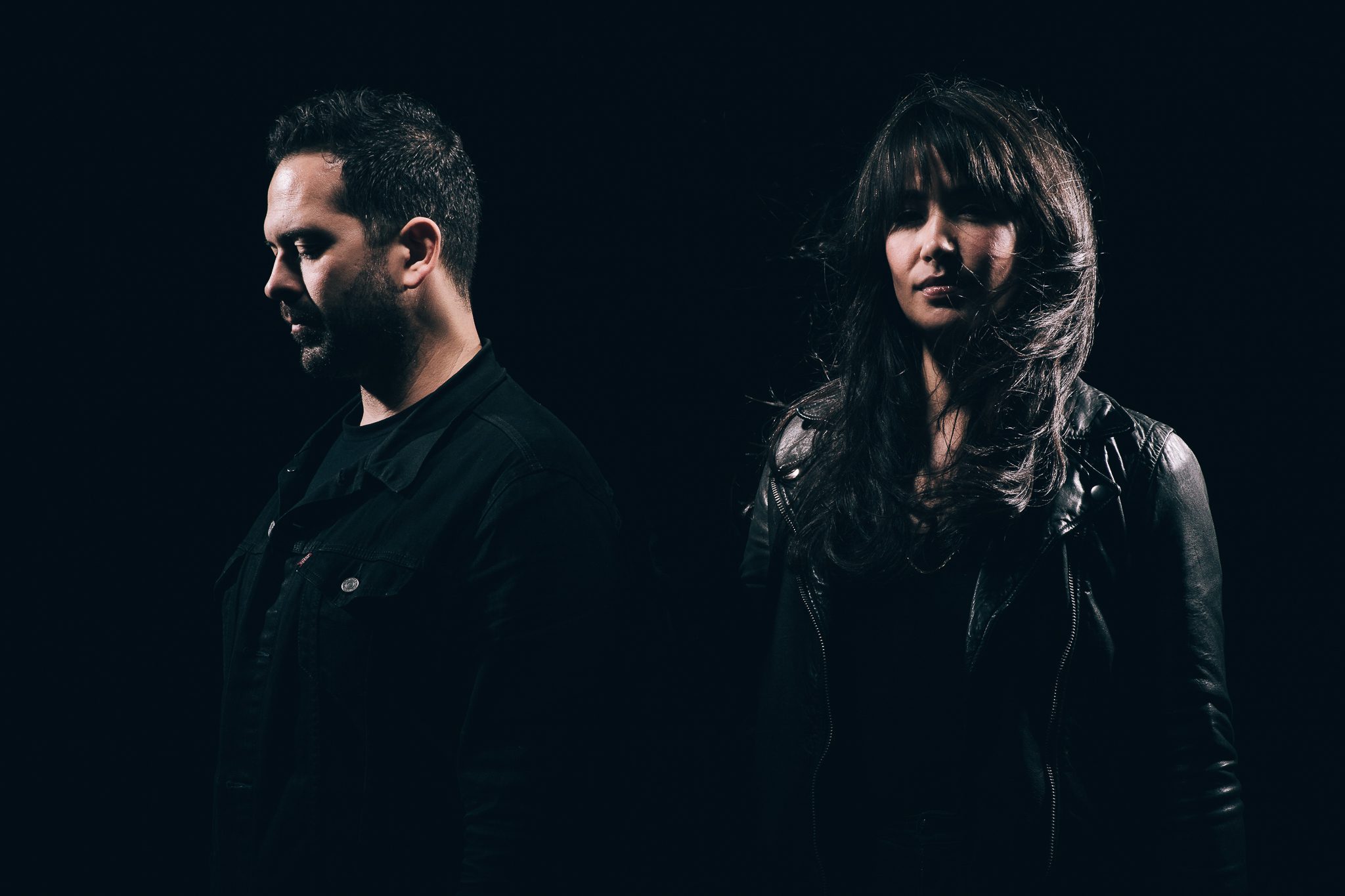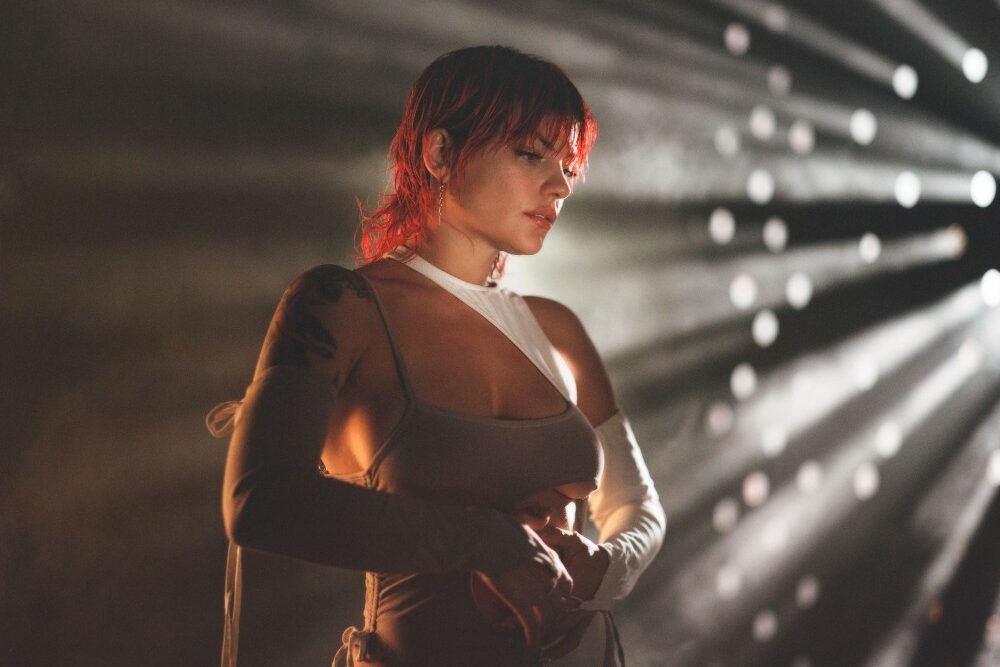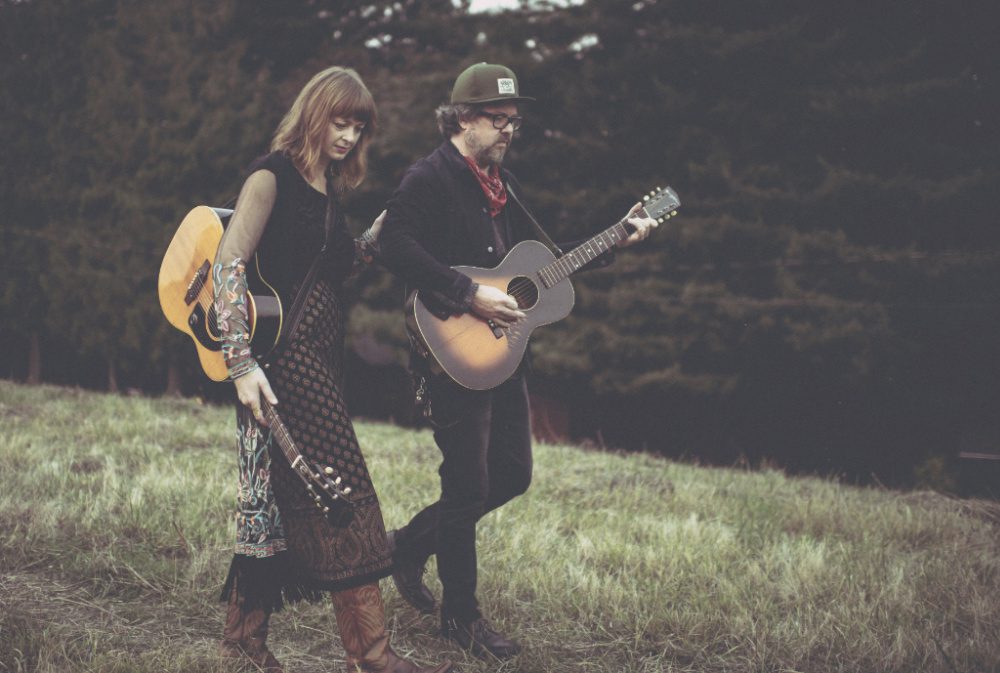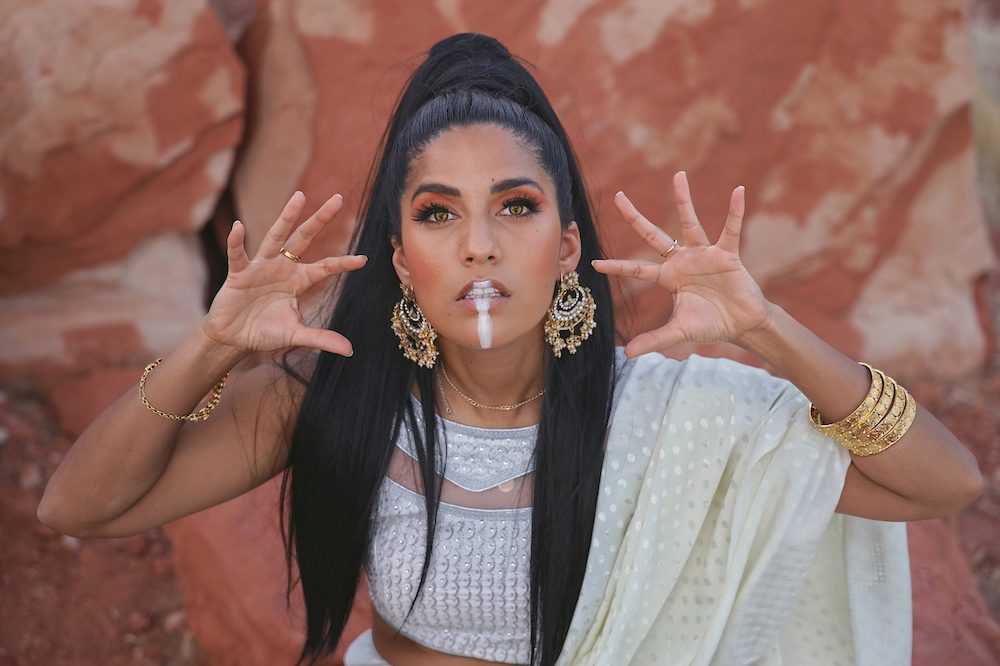ARTIST INTERVIEW + TRACK PREMIERE: NRVS LVRS, “Castling”

The couple that plays together, stays together. Especially if you play in a band called NRVS LVRS. Today is the premiere of their new single “Castling”, ahead of their sophomore album Electric Dread due out on June 30th. The track evokes feelings of mysticism and eternal wandering, utilizing a kind of darkwave “wall of sound“. We sat down with the SF natives to talk about what the writing process is like as a musical (and real life) duo. Take a first listen to “Castling” here!
So ya’ll are based in San Francisco…but where are you really from?
Bevin Fernandez: I grew up in South San Francisco, just outside of SF, but my family has been in San Francisco and the Bay Area for generations.
A native!!!
Andrew Gomez: And my parents were Cuban refugees, met in Miami, moved to Boston as my dad got his PhD there, and then moved the family out to San Mateo when I was 2. So, I’m pretty much Bay Area as well.
Living in LA, I just always assume everyone is from somewhere else. Not gonna lie. When I first moved to New York City, I used to put on M83’s ‘Midnight City’ and walk the streets at night feeling on top of the world (and kinda sad). Your music has a similar energy. How does living in San Francisco inform your sound?
A: Well, our first record was about the effects of the current tech industry on housing, the art and music scene, and basically how so many of our friends had to leave. So seeing this city that we love become too expensive for us to ever seriously consider settling down in is rough. This is where we our from and where Bevin’s family lives, and to know we will never be able to afford a home here is a bummer. So, that kind of tension between the mega rich and the rest of us just trying to survive is always there in our music, we think.
When did the inclination toward music start for each of you?
B: I grew up in a family that has a deep appreciation for music. My dad is a huge jazz fan, and my mom informed more of the rock side of things for me. We didn’t have a ton of money growing up, yet my parents made sure that my brothers and I had the opportunity to play music and have lessons as it was something they never were able to do, and definitely regretted. So, I started playing piano at around six, and then oboe from 4th grade until I graduated from high school. I’ve always seen music as essential to your well being, and I think that mostly stems from my parents love of it.
A: Music was usually in my house as well. My parents would listen to old Cuban records, the Beatles, CCR, Phil Collins, so a mix of music from their childhood and their early 20s. I was fascinated by their records and remember staring at them and accidentally scratching them as I tried to operate their turntable. I wanted a record for myself, so my mom took me to Tower where I bought the Weird Al record, “Weird Al in 3-D”. I didn’t think of playing music until I heard Nirvana, and I was like, “I want to do that.” From there I was self-taught with some help from my friends and have played in bands from high school to now.
And how did you two meet?
B: We met at the now closed Jelly’s in San Francisco. A friend of mine invited me to go to the show with her since her friend’s ex was in the band (not Andrew. ha) I figured the music was going to be terrible and ended up getting pretty drunk and was surprised when the music wasn’t that bad.
A: After we finished playing, a friend of mine at the show pointed out Bevin and her friend and pushed me to go talk to them. I’d never been a big approacher or pickup artist or anything, but was like ok. I made a beeline for Bevin, said, “Hi, I’m…” , and then Bevin grabbed my hand and we started dancing. Then, after the show, we went to an after party and chatted into the wee hours. And made out.
YAS. I do love that the scene of the crime is a concert.
B: yeah, whenever I tell that story, people like to make the joke, “were you a groupie?” I shut that nonsense down right quick.
A: We can’t revisit Jelly’s as it closed down after there was a stabbing there about a year or two later. So that’s fun.
When did your relationship take a turn for the musical?
B: Not until years later. I remember one late night when Andrew and I were discussing a Vashti Bunyun song, and I sang a part of it and Andrew commented that I had a nice voice. I always loved singing but never considered myself a singer in any way, but that little complement followed by his encouragement made me pursue singing more. The first time I ever sang in front of a group of people was when Andrew convinced me to do a Daniel Johnston tribute night at the Knockout in SF they used to have on his birthday.
A: Yeah, we kind of sorted out our relationship first, and then we started working together musically. I had a few songs that were more on the electronic side that weren’t getting used in my other projects, and we thought we could do them justice. Once we committed to it, all these other songs started flying out of us, so that was a kind of confirmation that we should be making music together. Also, the reactions we were getting live and from our recorded music were more encouraging than anything else I had been involved in.
NRVS LVRS has gone through a few iterations in terms of band members, but ultimately it’s been the two of you writing since the start. Has the dynamic shifted knowing that you’re writing for two performers as opposed to five or six?
A: Not really. We always have had the attitude that the song comes first. Finish that, and then worry about how to pull it off live later. There was a little bit of, “hey, there’s no guitar or bass in this song. maybe we should add some so our guitarist or bassist can play on it?” We’d give them a few shots at it, but there were certainly times where we just used synth bass or had no guitars because the song just didn’t call for it. We’ve always thought of the other people we work with as collaborators, but ultimately we’re steering the ship.
Andrew, in April of last year, you told SF Weekly: “We’re transitioning from a rock band with electronic elements to an electronic band with rock elements. There’s certain sounds on the computer you can’t get in real life and I kind of wanted to see what it would sound like.” Have you found that transition from rock to electronic difficult? Have there been any stumbling blocks?
A: I feel like we’re still writing songs as we always have, but the sounds have changed. What I mean is I think EDM and other electronic genres are written with making people dance as the core motive. So the arrangement reflects that. I feel like we have more song-oriented arrangements, if that makes sense. But, having said that, we’re learning new programs, learning how different keyboards work and getting a better understanding of drum programming. So there’s always a learning curve there. I find that new sounds really motivate me, so I’m always looking for a new patch or plug-in or keyboard setting to give me that.
Tell me a little about the track “Castling”. It has a mystical, ethereal quality to it. What’s the story behind that sound?
A: But as far as the sound, that came from getting a new pedal and running everything through it. It’s called a Pitchfactor, and it plays with signal in a really cool way. So, I just started playing guitar through it, and the chord progression was one of the first things I happened to play. Then I just started recording things over that. I’d say the first 3 or 4 things after that used that same pedal. We were listening to a lot of Kate Bush at the time, so to me I was pushing it to sound like Hounds Of Love. But, later, Bevin started singing her vocal line, and immediately owned the song. Initially, I wanted to sing on it, but that got nixed since I really liked Bevin on it.
Reading up about NRVS LVRS, there’s a lot of terms thrown around: Darkwave, chillwave, electropop, darkpop, indie rock…How do you define your music?
A: I feel like we’ve dabbled in all those things, but I guess we’d go with electronic darkwave even if that’s not perfect. Hard to detach and be able to categorize oneself from the outside. We don’t write overly cheery songs, but there’s probably plenty of darkwave lovers who wouldn’t consider us darkwave. What do you think?
Your sophomore album, Electric Dread, is set to come out soon. What can we expect in terms of tone / subject matter?
A: A couple of years ago I was getting panic attacks. I thought I was gonna die, and then go to the hospital where they’d say I’m fine. Anyway, the blanket of fear that starts to envelop you… I just thought of the words “electric dread” to describe the feeling and jotted it down. As we started writing lyrics, we moved away from just talking about anxiety and panic attacks and started moving towards situations and stories that seemed to discuss that feeling of impending doom.
I struggle a lot of with anxiety, so I hear ya. Last Fall, I had to cut myself off from NPR. I was having panic attacks in the middle of the day. Has the writing process helped with those feelings?
A: I haven’t had a full-blown one in awhile, cuz I can recognize where my mind is going and then head it off at the pass, so to speak. I think writing about it and occupying myself with music has certainly helped it, tho.
B: While I don’t personally suffer from panic attacks, I wanted to write about the dread and fear women experience in everyday life. That made its way into the subject matter of Silhouettes and Lost to the Max. Writing about it doesn’t change that it’s still a problem, but getting to sing about it is cathartic.
Is a tour on the horizon?
Yeah. We just finished a few west coast dates in Everett, Portland, Seattle, and LA, and we’ve got some in Sacramento and Chico coming up, but we are going to book a more extensive West Coast tour for July-August, and then we want to head out to the East Coast in September.
If you could go back in time, what advice would you give the pre-musician you?
A: I’d tell young me to just focus on getting good and to be honest with yourself, meaning compare your music to artists you love. Is it in the neighborhood in terms of quality when it comes to songwriting, sounds, and lyrics. No? Then, you don’t have to release it. Start again and try to do better this time around. The self-promotion stuff can wait until you’re really good.
B: Don’t ever stop playing music. When I graduated from high school, I abandoned music and dance as it felt like I was only doing it because I always had. I just focused on my major which wasn’t in the fine arts. If I could, I would encourage myself to have minored in music, or to still pursue it one way or another. Ultimately, music is what I love to do more than anything else, so in a way, I wish I knew that all along. But sometimes, you have to walk away before you realize these things.




